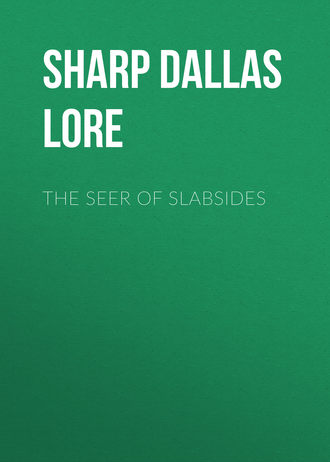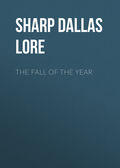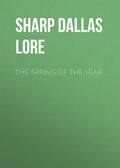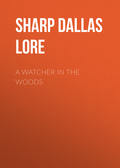
Sharp Dallas Lore
The Seer of Slabsides
John Burroughs was not an idyl, but an essayist, with a love for books only second to his love for nature; a watcher in the woods, a tiller of the soil, a reader, critic, thinker, poet, whose chief business these sixty years has been the interpretation of the out-of-doors.
Upon him as interpreter and observer, certain of his books, "Ways of Nature" and "Leaf and Tendril," are an interesting comment.
Truth does not always make good literature, not when it is stranger than fiction, as it often is; and the writer who sticks to the truth of nature must sometimes do it at the cost of purely literary ends. Have I sacrificed truth to literature? asks Burroughs of his books. Have I seen in nature the things that are there, or the strange man-things, the "winged creeping things which have four feet," and which were an abomination to the ancient Hebrews, but which the readers of modern nature-writing do greedily devour – are these the things I have seen? And for an answer he sets about a reëxamination of all he has written, from "Wake-Robin" to "Far and Near," hoping "that the result of the discussion or threshing will not be to make the reader love the animals less, but rather to love the truth more."
But the result, as embodied in "Ways of Nature" and in "Leaf and Tendril," is quite the opposite, I fear; for these two volumes are more scientific in tone than any of his other work; and it is the mission, not of science, but of literature, to quicken our love for animals, even for truth. Science only adds to the truth. Yet here, in spite of himself, Burroughs is more the writer, more the interpreter, than the investigator. He is constantly forgetting his scientific thesis, as, for instance, in the account of his neighbor's errant cow. He succeeds finally, however, in reducing her fairly well to a mechanical piece of beef acting to vegetable stimuli upon a nerve ganglion located somewhere in the region between her horns and her tail.
Now, all this is valuable, and the use made of it is laudable, but would we not rather have the account than the cow, especially from Burroughs? Certainly, because to us it is the account that he has come to stand for. And so, if we do not love his scientific animals more, and his scientific findings more, we shall, I think, love all his other books more; for we see now that, from the beginning, he has regarded the facts of nature as the solid substance of his books, to be kept as free from fancy and from false report, as his interpretation of them is to be kept free from all exaggeration and cant.
Here, then, are a score of volumes of honest seeing, honest feeling, honest reporting. Such honesty of itself may not make good nature-literature, but without such honesty there can be no good nature-literature.
Nature-literature is not less than the truth, but more; how much more, Burroughs himself suggests to us in a passage about his literary habits.
"For my part," he says, "I can never interview Nature in the reporter fashion. I must camp and tramp with her to get any good, and what I get I absorb through my emotions rather than consciously gather through my intellect… An experience must lie in my mind a certain time before I can put it upon paper – say from three to six months. If there is anything in it, it will ripen and mellow by that time. I rarely take any notes, and I have a very poor memory, but rely upon the affinity of my mind for a certain order of truths or observations. What is mine will stick to me, and what is not will drop off. We who write about Nature pick out, I suspect, only the rare moments when we have had glimpses of her, and make much of them. Our lives are dull, our minds crusted over with rubbish like those of other people. Then writing about Nature, or about most other subjects, is an expansive process; we are under the law of evolution; we grow the germ into the tree; a little original observation goes a good way." For "when you go to Nature, bring us good science or else good literature, and not a mere inventory of what you have seen. One demonstrates, the other interprets."
Careful as John Burroughs has been with his facts, so careful as often to bring us excellent science, he yet has left us no inventory of the out-of-doors. His work is literature; he is not a demonstrator, but an interpreter, an expositor who is true to the text and true to the whole of the context.
Our pleasure in Burroughs as an interpreter comes as much from his wholesome good sense, from his balance and sanity, I think, as from the assurance of his sincerity. Free from pose and cant and deception, he is free also from bias and strain. There is something ordinary, normal, reasonable, companionable, about him; an even tenor to all his ways, a deliberateness, naturalness to all his paths, as if they might have been made originally by the cows. So they were.
If Burroughs were to start from my door for a tramp over these small Hingham hills he would cross the trout-brook by my neighbor's stone bridge, and, nibbling a spear of peppermint on the way, would follow the lane and the cow-paths across the pasture. Thoreau would pick out the deepest hole in the brook and try to swim across; he would leap the stone walls of the lane, cut a bee-line through the pasture, and drop, for his first look at the landscape, to the bottom of the pit in the seam-face granite quarry. Here he would pull out his notebook and a gnarly wild apple from his pocket, and, intensely, critically, chemically, devouring said apple, make note in the book that the apples of Eden were flat, the apples of Sodom bitter, but this wild, tough, wretched, impossible apple of the Hingham hills united all ambrosial essences in its striking odor of squash-bugs.
Burroughs takes us along with him. Thoreau comes upon us in the woods – jumps out at us from behind some bush, with a "Scat!" Burroughs brings us home in time for tea; Thoreau leaves us tangled up in the briars.
It won't hurt us to be jumped at now and then and told to "scat!" It won't hurt us to be digged by the briars. It is good for us, otherwise we might forget that we are beneath our clothes. It is good for us and highly diverting, – and highly irritating too.
But Thoreau stands alone. "Walden Pond" is one of America's certain contributions to the world's great books.
For my part, when I take up an outdoor book I am glad if there is quiet in it, and fragrance, and something of the saneness and sweetness of the sky. Not that I always want sweet skies. It is ninety-eight degrees in the shade, and three weeks since there fell a drop of rain. I could sing like a robin for a sizzling, crackling thunder-shower – less for the sizzling and crackling than for the shower. Thoreau is a succession of showers – "tempests"; his pages are sheet-lightning, electrifying, purifying, illuminating, but not altogether conducive to peace. "Walden Pond" is something more than a nature book. There is a clear sky to most of Burroughs's pages, a rural landscape, wide, gently rolling, with cattle standing here and there beneath the trees.
Burroughs's natural history is entirely natural, his philosophy entirely reasonable, his religion and ethics very much of the kind we wish our minister and our neighbor might possess; and his manner of writing is so unaffected that we feel we could write in such a manner ourselves. Only we cannot.
Since the time he can be said to have "led" a life, Burroughs has led a literary life; that is to say, nothing has been allowed to interfere with his writing; yet the writing has not been allowed to interfere with a quiet successful business – with his raising of grapes.
He has a study and a vineyard.
Not many men ought to live by the pen alone. A steady diet of inspiration and words is hard on the literary health. The writing should be varied with some good, wholesome work, actual hard work for the hands; not so much work, perhaps, as one would find in an eighteen-acre vineyard; yet John Burroughs's eighteen acres certainly proved to be no check – rather, indeed, a stimulus – to his writing. He seems to have gathered a volume out of every acre; and he seems to have put a good acre into every volume. "Fresh Fields" is the name of one of the volumes, "Leaf and Tendril" of another; but the freshness of his fields, the leaves and the tendrils of his vineyard, enter into them all. The grapes of the vineyard are in them also.
Here is a growth of books out of the soil, books that have been trimmed, trained, sprayed, and kept free from rot. Such books may not be altogether according to the public taste; they will keep, however, until the public acquires a better taste. Sound, ripe, fresh, early and late, a full crop! Has the vineyard anything to do with it?







